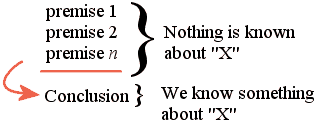|
When the premises of an argument affirm that nothing has been proved about something, and the conclusion makes a definite assertion about that thing, the argument commits an appeal to ignorance.
Examples:
- People have tried for centuries to prove the claims of astrology, but no one has ever succeeded. Therefore we must conclude that astrology is a lot of baloney.
- People have tried for centuries to disprove the claims of astrology, but no one has ever succeeded. Therefore we must conclude that astrology is a valid way of experiencing the world.
This fallacy is also sometimes called "Burden of Proof," since the burden of proof is placed on the wrong side. Another version occurs when a lack of evidence for side A is taken to be evidence for side B in cases in which the burden of proof actually rests on side B.
In many situations, one side has the burden of proof resting on it. This side is obligated to provide evidence for its position. The claim of the other side, the one that does not bear the burden of proof, is assumed to be true unless proven otherwise. The difficulty in such cases is determining which side, if any, the burden of proof rests on. In many cases, settling this issue can be a matter of significant debate. In some cases the burden of proof is set by the situation. For example, in American law a person is assumed to be innocent until proven guilty (hence the burden of proof is on the prosecution). As another example, in debate the burden of proof is placed on the affirmative team. As a final example, in most cases the burden of proof rests on those who claim something exists (such as Bigfoot, psychic powers, universals, and sense data).
Examples:
- Bill: "I think that we should invest more money in expanding the interstate system."
Jill: "I think that would be a bad idea, considering the state of the treasury."
Bill: "How can anyone be against highway improvements?"
- Bill: "I think that some people have psychic powers."
Jill: "What is your proof?"
Bill: "No one has been able to prove that people do not have psychic powers."
- "You cannot prove that God does not exist, so He does."
- You cannot prove that God exists, therefore He doesn't.
Arguments of this form assume that since something has not been proven false, it is therefore true. Conversely, such an argument may assume that since something has not been proven true, it is therefore false.
(This is a special case of a false dilemma, since it assumes that all propositions must either be known to be true or known to be false.)
As Davis writes, "Lack of proof is not proof." (p. 59)
More Examples:
- Since you cannot prove that ghosts do not exist, they must exist.
- Since scientists cannot prove that global warming will occur, it probably won't.
- Fred said that he is smarter than Jill, but he didn't prove it, so it must be false.
Proof: Identify the proposition in question. Argue that it may be true even though we don't know whether it is or isn't.
References:
Copi and Cohen: 93, Davis: 59
<< Return
|

